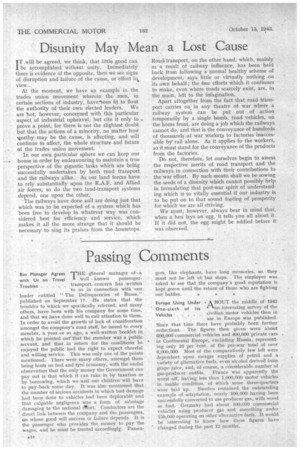Disunity May Mean a Lost Cause
Page 16

If you've noticed an error in this article please click here to report it so we can fix it.
I T will be agreed, we think, that little good can be accomplished without unity. Inimediately there is evidence of the opposite, then we see signs of disruption and failure of the cause, oreffort ii view..
At the moment, we have an example in the trades union movement wherein the men, in certain sections of industry, haveteen fit to flout the authority of their own elected leaders. We are hot, however, concerned with this particular aspict of industrial upheaval, but cite it only to prove a point, for there is not the slightest doubt but that the actions of a minority, no matter how worthy may be the cause, is affecting, and will continue to affect, the whole structure and future of the trades union movement.
In our own particular sphere we can keep our house in order by endeavouring to maintain a true perspective of the gigantic tasks. which are being successfully undertaken by both road transport and the railways alike. As our land forces have to rely substantially upon the R.A.F. and Allied air forces, so do the two land-transport systems depend, one upon the other. -The railways have done and are doing just that which was to be expected of a system which has been free to develop in whatever way was considered best for efficiency and service, which makes it all the more strange that it should be necessary to sing its praises from the housetops. Road transport, on the other hand, which, mainly as a result of railway influence, has been held back from following a normal healthy scheme of development, saYs little or virtually nothing on its own behalf ; the fine efforts which it continues to make, even where roads scarcely exist, are, in the main, left to the irnagination.
Apart altogether from the fact that road transport carries on in any theatre of war where a railway system can be put out of action temporarily by a single bomb, road vehicles, on the home front, are doing a job which the railways cannot do, and that is the conveyance of hundreds of thousands of war workers to factories inaccessible by-rail alone. As it applies to the workers, so it must stand for the conveyance of the products from the factories.
Do not, therefore, let ourselves begin to assess the respective merits of road transport and the railways in connection with their contributions to the war effort. By such means shall we be sowing the seeds of a disunity which cannot possibly help in formulating that post-war spirit of understanding which is so vitally essential if our industry is to be put on to that sound fopting of prosperity for which we are all striving.
We must, however, always bear in mind that, when a hen lays an egg, it tells you all about it. If it did not, the egg might be addled before it was observed.




















































